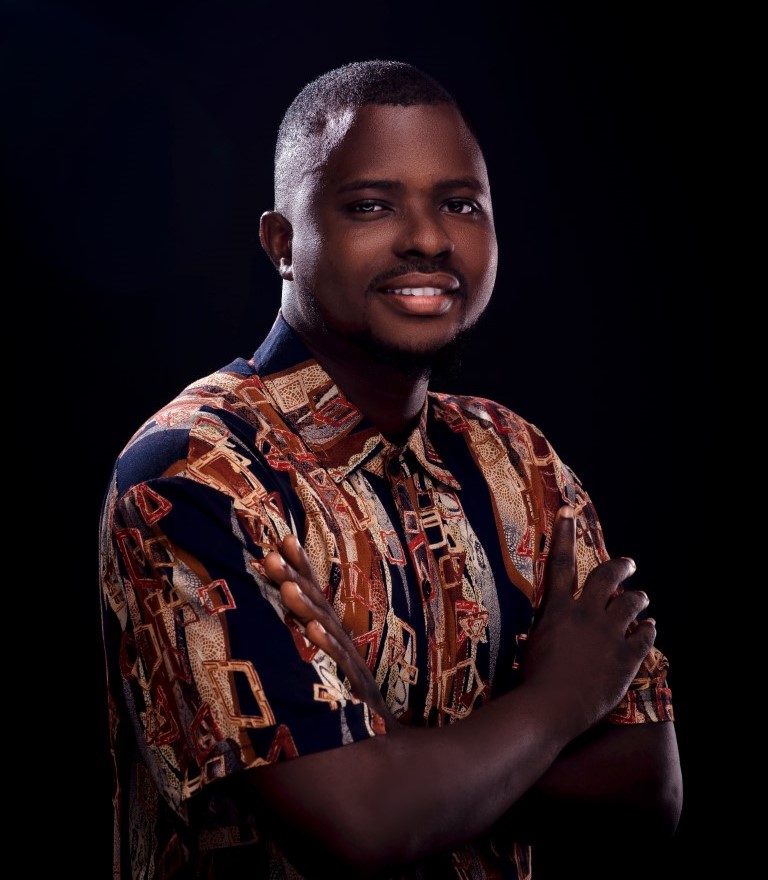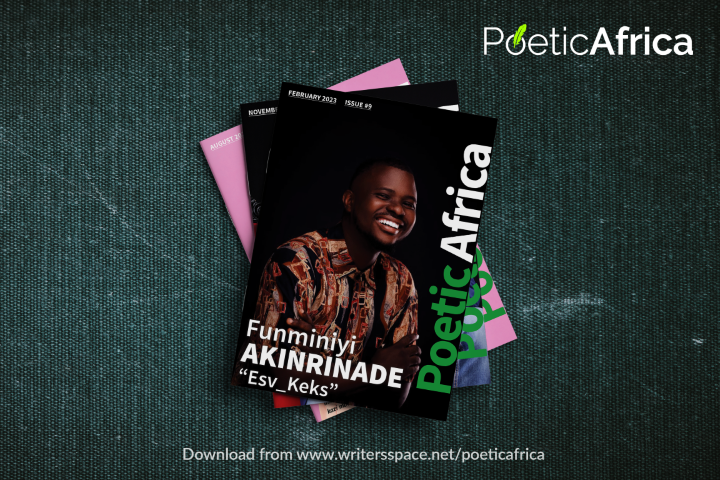Interview by Elizabeth Akunyili (Nigeria) and Sandra Nadege (Kenya)
Funminiyi, I find you very inspiring as a creative person. From your poetry anthology ‘Si(gh)lent Night’ to owning your ghostwriting business to heading the review team of a popular magazine in over 40 countries. How do you do it?
Tell me what your average day looks and feels like because I need to know how you cram it all in.
Well, my average day wears different attires, depending on my daily plans. Sometimes, you may see me on a Lagos red bus, trying to meet up with lectures at the University of Lagos (I’m a student, winks). Some days, you may see me seated in front of my laptop, trying to beat my clients’ and personal deadlines. On other days, I may brainstorm ideas for my projects and coordinate the platforms I head or lead.
Whew! That’s a lot! What has helped you build this kind of consistency and discipline? I am diving deep here because I have been privileged to see your work evolve over the years.
I belong to literary communities that serve as support systems and help keep my dreams in check. Also, the nudge to grow and keep the pen moving aids my consistency and growth.
Tell us about your OctoFest Poetry
OctoFest Poetry is an October 1st poetry festival that seeks to reflect on and address issues concerning Nigeria since independence, using poetry as a tool. Last year, we had the maiden edition on October 1st, tagged “Crawling at 60s with Funminiyi” at Obafemi Awolowo University, Ile-Ife. We had activities like spoken word performance, games, and poetry reading from two anthologies published in 2020: 60 Seconds Silence and Claws of Hope (curated by Rahma O. Jimoh). Also, we discussed “2020 and Now, what has changed and the way forward?” I believe the world was formed with words, and through words, we can reform it and make it more accommodating. And this is what I intend to yearly do with OctoFest Poetry by God’s Grace. For this year, Africa is invited!
I’m curious about something – your career. If you have so much passion for literature, why didn’t you just study to become a creative writer?
LMAO. I wish I had found creative writing before I gained admission to study Estate Management at Obafemi Awolowo University, Ile-Ife (it’s surprising that I’m currently running a Master’s degree program in the same course). I was in my 2nd year before I figured there was something called creative writing. However, I still plan to study creative writing. It is in the pipeline. One day, I want to be addressed as a Professor of Poetry (speaking into existence, winks).
Yes! Yes! I can’t wait. I’d like to introduce an old guest we’ve all met all over again. Welcome Professor Funminiyi Akinrinade!!! Phew! That does sound nice already!
Let’s not get too excited because I’m hyper and I’m about to lead us all astray. Hahahaha. How did your career journey begin?
Nine years ago, my journey as a writer began. It was unplanned, really. This was because growing up, I wanted to become a businessman (well, I am now, in the business of writing). However, just a WhatsApp group link to join a poetry community (formerly named JP Laconic, now Kartoon’s Nexus of Bards) changed the story for me. To say I was intimidated by the members’ poetic prowess would be an understatement because I knew little or nothing about poetry before I joined. The community opened me to a world of individuals who chewed creativity like gum and connected me with other communities like the Speaking Pen International Concept (SPIC) Family and Writers Space Africa. And yes, here we are today.
What were the defining moments in your career and self-identity like? Would you like to share any?
If I don’t share them, ‘the defining moments’ wouldn’t be pleased, LMAO. First, in 2017, I figured that ‘silence’ intrigues me, and so the idea to curate an anthology that would revolve around the concept plummeted into my mind. This was the first time I would be collaborating with other African poets on a larger scale. I titled the anthology Si(gh)lent Night, and it explored themes like domestic violence, rape, robbery, fetish crimes, and prostitution. I considered it a defining moment because it helped shape my identity as a poet. Silence still intrigues me, which led to the second anthology I initiated in 2020 – 60 Seconds Silence.

When did you realize poetry was your thing?
Since I identified as a ‘sigender.’ As I earlier stated, silence intrigues me, and the language of poetry to convey this silence fascinates me more. I admire how I can weave words with metaphor and the silence will speak to my readers’ senses.
How did you keep your love for poetry alive amidst the myriad of things you are good at?
The cries of those whose silence needs to be heard wouldn’t let me stop writing poetry. So, knowing the purpose of why I write poetry keeps the fire burning. Also, I get to prioritise what I do per time, and with that, one interest doesn’t affect the other.
Let’s talk about your book ‘60 Seconds Silence’ . The title is intriguing! What inspired the title and what is the collection about?
In 2018, I read a poem titled A Minute Silence, and since then, I have held onto it. So, in 2020, the idea of initiating another anthology dropped in my mind. And the perfect title for the anthology was 60 Seconds Silence. This was because we needed to silence many things around us, and as poets, we were in the best position to express it. The call for submission was released when Nigeria celebrated her 60th birthday to drive home further the theme. The themes revolved around fear, grief, oppression, silence, and solitude.
Soma Mazungumzo na Christina Lwendo
Aaaah! A minute/60 seconds at a 60th Anniversary – you got us right there! What mindset do you think every creative needs to have to succeed as an individual and contribute to Africa as a continent?
A mindset that sees solutions when everyone keeps seeing the problem. In short, a positive and solution-inclined mindset.
What are your challenges regarding mentoring young writers?
Some young writers don’t want to put in the required effort, yet they want to be mentored. They want to see improvement just through following or learning from the mentor. But really, it doesn’t work that way. Mentors aren’t magicians, they are there to guide you, not to deposit everything you need to know. Therefore, mentoring someone who’s not committed to exploring beyond what I say, write, or do is challenging.
You have a room full of writers from all over Africa; what will you say to them as they return to their various countries and responsibilities?
We are beyond ‘keypad warriors.’ Through words, we can save or destroy a nation. We must rise and provide solutions to African problems through our power-packed words. We need to think about collaboration. We need to host physical and virtual events that will shake the nation. For instance, I started “OctoFest Poetry” last year, an annual event. The event will be held every October 1st to celebrate Nigeria’s independence and use poetry to address societal issues. You may emulate such in your country. Love and light.
Lisez – Une conversation avec Eloga Arsène
As a businessman, what five ways would you recommend for writers to monetize their creativity?
First, hone your craft, build your creative portfolio and send proposals to places that need your service. Second, through ghostwriting. Third, author a book. Fourth, create a digital course/class around what you do, and lastly, through mentorship.








